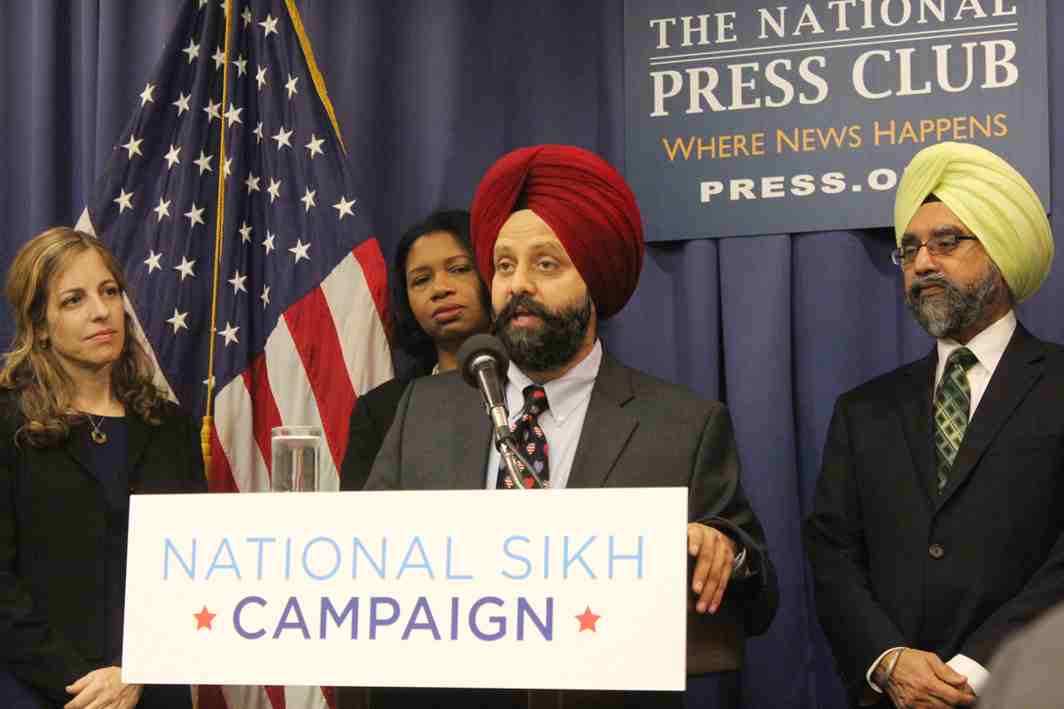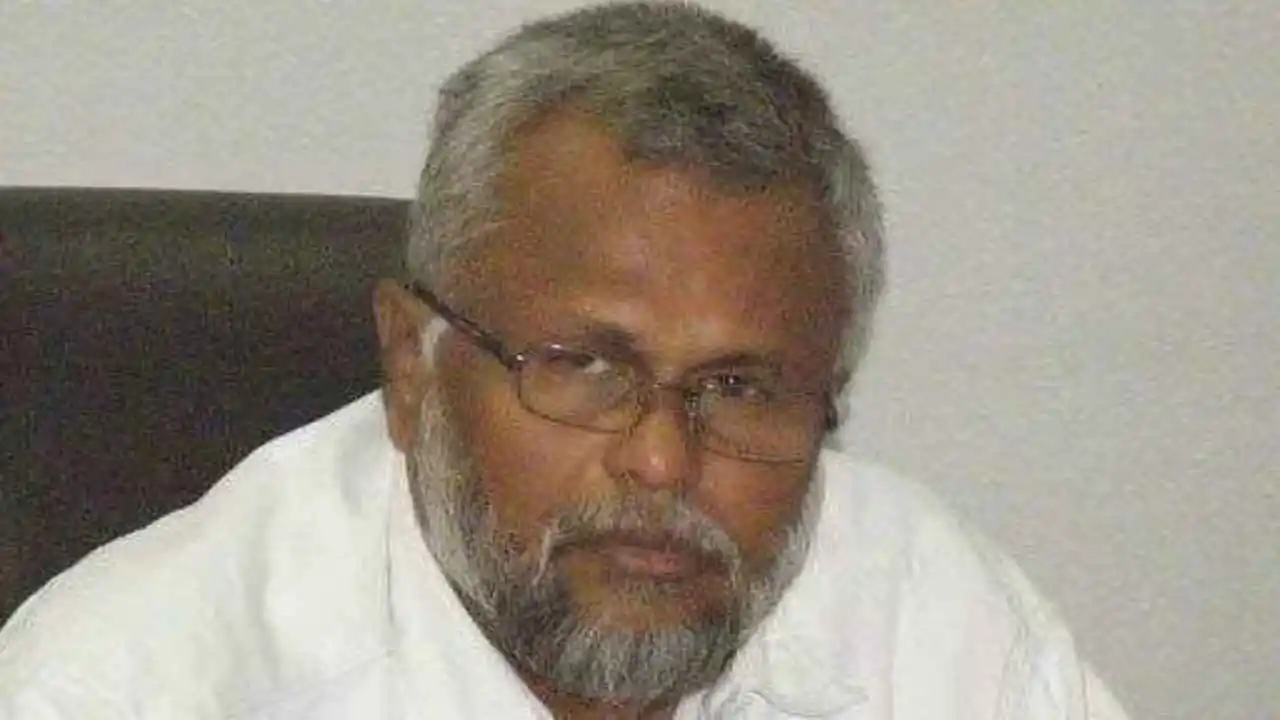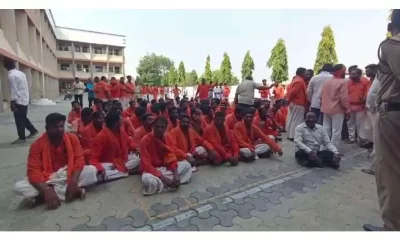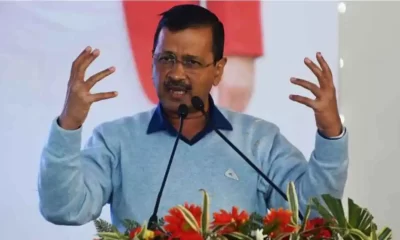Latest world news
American Sikhs launch campaign to spread awareness about their community, counter hate crimes

National Sikh Campaign says that despite the many contributions by Sikh-Americans, 60 per cent of Americans admitted they knew nothing about the community and 66% of Americans have never interacted with a Sikh before.
Feeling victimised and often the target of hate crimes in USA, American Sikhs today launched a nationwide million-dollar campaign to spread awareness and address the “collective misunderstanding” over the minority community amid a spike in hate crimes against them in the country.
Sikhs look distinctly different with their turban and full beard. To many Americans, they look the same as Islamists and post-9/11, some white US citizens treat them all as supporters of terrorism if not actually being terrorists.
A widely reported incident of such hate crime was that in May, when some white men brutally assaulted an IT specialist Maan Singh Khalsa, cutting off his hair and nearly snipping off the little finger of his right hand – all because of his appearance.
Last weekend, several eminent Sikh-Americans from across the US, lawmakers, government officials and local leaders participated in prayers weekend to mark fifth anniversary of a mass shooting by a white supremacist that claimed the lives of six Sikhs at a Gurdwara in the Wisconsin city.
On Wednesday, a month-long ‘We are Sikhs’ campaign was launched by the National Sikh Campaign (NSC), a non-profit organisation, to coincide with the Sikh festival of Vaisakhi.
It is a massive initiative to spread awareness of the Sikh religion and Sikh-Americans throughout the US as over 65% of Americans are ignorant about Sikhism.
A report in Los Angeles Times in June cited Sikh community leaders as saying they’ve seen another uptick since the 2016 presidential election and the Trump administration’s proposed immigration and travel bans. Those proposals, they argue, are fuelling an intensified xenophobia.
The FBI began collecting data on anti-Sikh, anti-Arab and anti-Hindu hate crimes for the first time in 2015. Only six of the incidents in the most recent FBI report were anti-Sikh hate crimes, but the bureau said it takes years to get an accurate accounting.
According to Sikh advocacy groups, such incidents are under-reported and do not include other hate-filled attacks, such as discrimination or hate speech — a concern buoyed by law enforcement data. Many cities either did not report hate crimes or reported zero hate crimes, according to the FBI report.
While some of the violence against Sikhs stems from misconceptions about their background — attackers assume they are Muslim or Middle Eastern — experts say much of it is fuelled by a prejudiced response to their darker skin, beards or turbans, the LA Times report said. It recalled that earlier this year, two Sikhs and two other Indian men were shot in attacks in Kansas, Washington and South Carolina. In two of the incidents, authorities said the shooters expressed a variation of the same sentiment: Go back to your country.
Community members are working to strike a balance in its efforts to educate the public about Sikhism — aiming to differentiate themselves through awareness campaigns and local outreach without appearing to condone attacks on Muslims and other minorities.
The NSC’s ‘We are Sikhs’ campaign is a “national effort to help inform our fellow Americans about who we are and why we are proud to wear the turban, a symbol of our community’s commitment to equality and serving others,” co-founder and senior advisor of the National Sikh Campaign Rajwant Singh said.
“Sikh-Americans are pillars of their communities in every corner of our nation and we must work to proactively meet and connect with our neighbours,” he said.
The campaign would involve marketing and public relation efforts that will focus on increasing the Sikh-American community’s presence in national and local news outlets, online platforms and neighbourhoods. It will utilise national and local television and cable and digital advertisements, social media and community events to affect change.
Its organisers said the Sikh community has been the target of discrimination, intimidation, harassment and hate crimes since the 9/11 terror attacks largely because of a “collective misunderstanding” of what the turban means in the Sikh faith.
“Sikh values are American values, and Sikh-Americans have been making positive and significant contributions to American life for more than a century. We run local businesses and sing our national anthem with pride,” Gurwin Singh Ahuja, co- founder and executive director of the NSC said.
“The American dream is fundamental to our identity here in America, and we believe deeply in the freedom to pursue one’s own success through hard work,” Ahuja said.
Elaborating on the campaign, Singh had told PTI this week that the “seven-figure” targeted ad campaign will run on cable TV networks like CNN and Fox as well as on local TV stations and will have a heavy presence on social media.
There will be 40-50 spots on CNN and other networks and will be shown in morning and prime time bulletins, circulating throughout the day. The campaign will run for a month throughout the nation.
“We have brought a very scientific and targeted messaging element to the campaign. Our focus is to build a proactive and positive message and try to educate and inform Americans about the positive contributions the Sikhs have been making in America,” Singh said.
For the campaign, the organisers have roped in prominent marketing experts and firms, which have in the past done presidential-style campaigns for former presidents Barack Obama and George Bush.
The campaign has been tested over a period of time and through polls and focus groups, the organisers narrowed in on what message would move the public opinion.
NSC, however, said that despite the many contributions by Sikh-Americans, 60 per cent of Americans admitted they knew nothing about the community and 66% of Americans have never interacted with a Sikh before.
While this lack of awareness and interaction exists, the NSC said it believes there is enormous potential to enhance positive feelings and familiarity towards Sikh-Americans through the campaign.
Latest world news
Bigg Boss 14 contestant Rahul Vaidya struggles walking in knee deep water, compares Dubai rains with Mumbai floods
Singer and TV personality Rahul Vaidya was recently stranded in the Dubai rains.

Rahul Vaidya, who was in Dubai ahead of his show which was scheduled to take place today, left the country due to heavy rains and reached Kolkata. The artist shared on social media his encounters in the UAE city, including challenges like walking through knee-deep water. Rahul provided an update regarding the heavy rainfall in Dubai on his Instagram profile.
The Bigg Boss 14 contestant revealed that he was in Kolkata and prepared to do an evening performance. Recalling the terrifying period he went through, Vaidya said there was a lot of confusion and panic in Dubai. The situation was similar to that when heavy floods hit Mumbai in 2005.
Vaiday also posted seval other images and videos of cars that were underwater and flooded roadways. The Bigg Boss 14 contestant, who shared his ordeal, claimed that even though it had just rained for two hours, the situation was dire.
In one of the video, which went viral he can be seen struggling in walking in knee-deep water. He can be also seen holding his sneakers in one hand and with other hand he was seen managing other things.
This is the result of the two hours of rain that it had, he can be heard saying in the video. Vidya also said he dosen’t believe Dubai is accustomed to a lot of rain. Everything had stopped working, he remarked.
After taking part in the first season of the singing reality show Indian Idol, Rahul Vaidya gained widespread recognition. In addition to Bigg Boss, he took part in Khatron Ke Khiladi 11.
Meanwhile, heavy rains that triggered flooding in the UAE and Bahrain, which left 18 people dead in Oman on Sunday and Monday, have paralyzed the financial hub of the Middle East, Dubai.
A lot of incoming flights were diverted from Dubai’s international airport because of the rain. At 7:26 p.m., the busiest airport in the world for foreign visitors stopped accepting new arrivals; a gradual resumption was announced for more than two hours later.
Images of planes navigating flooded tarmacs are making the rounds on social media.
According to pictures shared on social media, the flagship malls Dubai Mall and Mall of the Emirates both experienced heavy floods, while at least one Dubai Metro station had water up to the ankles.
There were several road collapses, severe flooding in residential areas, and numerous reports of leaks from windows, doors, and roofs.
Due to the unfavourable weather, schools around the United Arab Emirates were forced to close, and as more storms are predicted, the closures are anticipated to last until Wednesday. The government of Dubai allowed its staff to work remotely till this Wednesday.
Latest world news
Dubai sky turns green during storm in UAE, video goes viral
The UAE witnessed record-breaking rainfall on Tuesday and the National Centre of Meteorology recorded 254 mm of rainfall in less than 24 hrs in the Khatm Al Shakla area in Al Ain.

1 person was killed in UAE as it witnessed heavy rainfall on Tuesday, stranding commuters, flooding roads, disrupting trains and flights and resulting in water leakage from mall ceilings. The UAE witnessed record-breaking rainfall on Tuesday and the National Centre of Meteorology recorded 254 mm of rainfall in less than 24 hrs in the Khatm Al Shakla area in Al Ain. It is being said that the rainfall was the highest documented since the start of data collection in 1949.
The heavy rainfall in UAE came days after a similar situation in neighbouring Oman, where 13 people were killed in flash floods. Many parts of Oman saw torrential rains, which caused students to be trapped in buses and swept away motorists and trapped people in their homes.
Videos from Dubai circulating on social media showed widespread waterlogging on roads in Abu Dhabi, Dubai and other important cities. This left daily commuters in cars and other vehicles struggling to get back home. Dubai metro station too was seen flooded and closed.
One such video circulating on social media shows the aerial view of the city of Dubai from the top of a building. In the video the stormy winds are seen blowing over the city of Dubai. As the storm intensifies the Dubai sky turns green and ultimately gets covered by heavy rainfall. The video has gone viral on social media with more than 1.1 million views.
Another video showed water leakage from the ceilings of shopping malls, flooding the floors and destroying goods. A video which was shot in the famous Mall of the Emirates, showed pieces of ceiling falling as the rainwater gushed inside. Videos from many outlets of the Deira City Centre mall chain showed escalators being rendered unusable. Majid Al Futtaim, the company which owns the Mall of Emirates, said that the shopping complexes have been kept open and the customers are being sent away from the flooded areas.
India News
Sri Lankan Minister Douglas Devananda says statements on reclaiming Katchatheevu island from Sri Lanka have no ground
Devananda told the media on Thursday that it is not unusual to hear such claims and counterclaims about Katchatheevu as elections are taking place in India.

Sri Lankan Minister Douglas Devananda has said the statements from some political leaders in India on reclaiming Katchatheevu from the island nation have no ground. He told the media on Thursday that it is not unusual to hear such claims and counterclaims about the strategic island as elections are taking place in India.
The Sri Lankan Minister said he thought India is acting on its interests to secure this place to ensure Sri Lankan fishermen would not have any access to that area and that Sri Lanka should not claim any rights in that resourceful area. According to the 1974 agreement, Devananda said Indian and Sri Lankan fishermen can go fishing in the territorial waters of both countries until the pact was reviewed and amended in 1976.
The amended agreement resulted in fishermen from both countries being barred from fishing in neighboring waters. India’s ministry of External Affairs (MEA) on Thursday steered clear of the row surrounding Katchatheevu island. To a volley of questions on the Katchatheevu issue, MEA spokesperson Randhir Jaiswal reffered to External affairs Minister S Jaishankar’s recent comments on the matter.
He said he would like to talk about the issue that has been raised. He added the External Affairs minister has spoken to the press here in Delhi and also in Gujarat and has clarified all the issues. He said everyone should look into the press engagements and they would find the answers to their questions there.
The remarks from Devananda, a Sri Lankan Tamil, came days after the Narendra Modi government accused the Congress and its ally DMK in Tamil Nadu of overlooking national interests by handing over Katchatheevu island to Sri Lanka in 1974. The BJP has also been slamming the 2 parties for not ensuring the rights of the fishermen wanting to fish in waters around the island.
-

 LATEST SPORTS NEWS12 hours ago
LATEST SPORTS NEWS12 hours agoIPL 2024: Delhi Capitals thrash Gujarat Titans by 6 wickets
-

 India News9 hours ago
India News9 hours agoReligious outfit vandalises The Blessed Mother Teresa High School in Telangana after teachers object to students wearing Hanuman Deeksha dress
-

 Entertainment7 hours ago
Entertainment7 hours agoBollywood stars Vidya Balan, Kartik Aaryan, Pratik Gandhi, Ileana D’Cruz, Mouni Roy, Radhika Madan, Mrunal Thakur attend Do Aur Do Pyaar premiere
-

 India News10 hours ago
India News10 hours agoClashes erupt during Ram Navami procession in West Bengal’s Murshidabad district
-

 Cricket news6 hours ago
Cricket news6 hours agoHappy Birthday KL Rahul: Suniel Shetty wishes son-in-law KL Rahul on his 32nd birthday
-

 India News5 hours ago
India News5 hours agoEnforcement Directorate seizes Shilpa Shetty’s husband Raj Kundra’s properties worth Rs 97 crore
-

 India News3 hours ago
India News3 hours agoEnforcement Directorate says Arvind Kejriwal is deliberately eating mangoes, sweets, taking sugar with tea to increase his blood sugar level and create ground for bail

